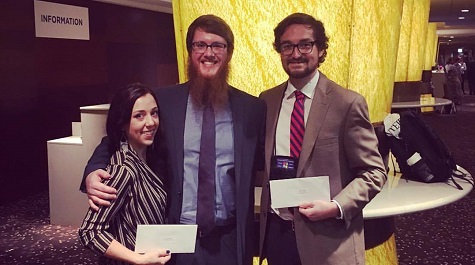Counseling students awarded research grants
Preparing for the future by studying the present
According to the U.S. Census Bureau, there are currently 48 million people age 65 and older, and that number is expected to grow to more than 70 million by the year 2030. Accompanying this increase is a shortage of doctors, nurses, and other medical professionals who specialize in the care of older adults. One student has received a research grant to explore counseling students’ interest in working with older adults.
Nathaniel Wagner, a doctoral student in his third year, is conducting his dissertation study on how and why master’s-level counseling students become interested in working with older adults. The dissertation, formally titled “Factors that Contribute to and Mediate Counseling Students Interest in Working with Older Adults,” was created out of Wagner’s recognition that no studies had been conducted on the variables that predict counseling students’ interest in older adults. He was awarded two grants to conduct his study, one from the Association for Adult Development and Aging and another from the Association for Counselor Education and Supervision.
The study consists of a survey given to about 500 counseling students, both at W&M and at other universities across the country. Wagner leveraged the counseling program’s strong alumni network to share the survey with fifteen program alumni who are now faculty members in other counselor education programs. He expects to receive all the surveys by November 1, and then comes the task of consolidating and analyzing the data.
Wagner will focus on five factors that he believes influences counseling students’ desire to work with older populations: belief in counseling skill, attitudes about aging, contact with older adults, knowledge of aging, and interest in working with older adults. He has several theories about how these factors interact with each other, including that contact with older adults and knowledge of aging will positively influence wanting to work with them.
“There are no studies looking at counseling students specifically, so I saw a need in the field,” he said when discussing his work. He says his dissertation, once finished, would be a great fit for several gerontology and counselor education journals. “I’m hoping these results will provide insight into how counselor education programs can effectively work with students to increase their interest. They won’t show cause and effect but they will raise awareness.”
Adaptability through role-play
Counseling students have to be able to think on their feet to adequately respond to the needs of their clients. It is impossible to predict what topics a patient may want to discuss on any given day, or what information they will choose to share. Consequently, cognitive flexibility, or the ability to consider many aspects of a situation at once and change topics quickly, is a very important skill for a successful counselor.Laura Pignato, a second-year doctoral counseling student, has secured a research grant from the Southern Association of Counselor Education and Supervision (SACES) to test cognitive flexibility in master’s-level counseling students. Her methods are unique, and make the future results of her research findings all the more intriguing. She will be conducting a ten-week improv theater training with these students to see how group improvisation affects students’ cognitive flexibility and anxiety levels.
The study is titled “Improving Through Improv: Promoting Tolerance for Ambiguity and Counselor Development.” After the study is completed, she plans to write an article accompanying it and submit both for presentation at several conferences, including the American Counseling Association, Association of Counselor Education and Supervision, and Southern Association of Counselor Education and Supervision, which gave her the grant.
Pignato says her love for improv grew out of a group she participated in for fun in her own master’s program, but that she didn’t realize the potential research implications until later in her counseling career. She is excited to combine two of her passions, counseling and improv theater, into one study that can potentially help counseling students think on their feet and be prepared for whatever their clients may need. “Hopefully, this could be a creative way to help ease beginning counseling students’ anxieties and ability to think in the moment when needed.”
Measuring what works
Colin Vaughn and Sean Newhart, both second-year doctoral counseling students, have a passion to quantify what makes good counselors great. With a new research instrument they’re developing, counseling instructors would be better able to measure how their students are retaining information and putting theory into practice. They both also received a prestigious grant from SACES to grow their research from the confines of the School of Education to across the country.The instrument they’re creating will measure counseling students’ skills in a variety of settings, including listening skills, responses to clients, ethnical decision-making, and more. “The theory we are basing the scale off of is very complex, and has 24 different areas that could be measured. Therefore, we are starting with what seems to be one of the more objectively measured and apparent constructs, intervention skills,” Newhart said.
Originally tested with doctoral students both at William & Mary and other counseling programs, the study will grow to include faculty evaluations of the students they supervise at schools across the country over the coming months. Titled “Development of the Counseling Intervention Skills Competence Scale,” the pair hopes to have the evaluations sent out for supervisors to complete in the spring semester and initial data collection wrapped up by next fall.
When asked what they were most excited to discover, Vaughn replied, “If our scale works! Instrument development is a long process, and there’s always a chance that you haven’t done a particularly good job of measuring what you’re trying to measure.” The challenge of quantifying the effectiveness of a counseling student is no easy one, but these two have proven that they measure up to the task.
